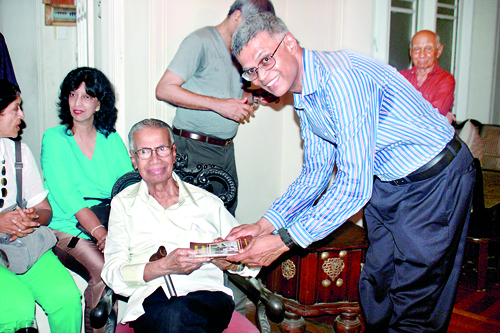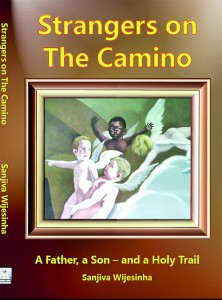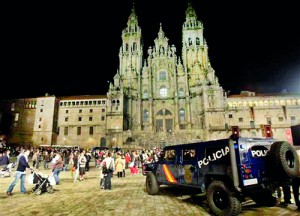Walking the Camino for body and mind
I enjoyed your perspective as a doctor walking the Camino. Are there any medical benefits to walking a pilgrimage that you can share with our audience?
Definitely!
In addition to the spiritual benefits of walking the Camino, there certainly are medical benefits. These are two-fold – beneficial effects on the Body as well as on the Mind.
Physically, one has the opportunity over four to six weeks of doing all the preventive health activities that doctors constantly keep telling us are the foundations of good health – such as regular aerobic exercise that has the heart, lungs, muscles and joints working, exposure to fresh air and sunshine, eating no more calories than we can burn off by the day’s activity.
From a psychological point of view, one benefits because one can let go of all the trials and tribulations of everyday life and allow one’s ‘brain computer’ to defragment itself.

The author Dr. Sanjiva Wijesinha presenting the first copy of the book ‘Strangers on The Camino’ to his father, former Secretary General of Parliament and Ombudsman, Sam Wijesinha. Pic by Athula Devapriya
You can dispense with things like ‘to do’ lists, work schedules and palm pilot planners, slacken the hectic pace of 21st century life to the natural rhythm of human walking – and concentrate simply on walking at your own place, taking the time to savour the splendour of creation around you as well as the company of like-minded human beings
You’re a doctor with a busy practice and a university professor with many students. What do you say to people who argue that they can’t take the time off from their busy schedules to walk the Camino?
As a doctor I often have cause to tell my patients – particularly those with coronary heart disease or diabetes – that they would benefit from modifying their sedentary lifestyle and undertaking adequate physical exercise. The usual response is ‘But Doctor, I just don’t have enough time to exercise!”
I then gently point out to them that what they are really telling me is that although they have enough time (since every one of us has 24 hours in a day) exercise does not come up high enough in their list of priorities. Spending 24 hours a day creating wealth or writing research papers will only make you the richest or most famous man or woman in the cemetery!
 One of the most useful pieces of advice I received was ‘The Rule of Threes’ given me by Dr. Buddy Reid, a Sri Lankan surgeon who I have looked upon as my mentor. “Make sure” he told me “that you use three hours every week, three days every month and three weeks every year to take time off the busy work schedule that you will inevitably have. Use the three hours to exercise, the three days to read and spend time with friends, the three weeks to go away from home on a vacation with the family. Fitness, Friendships and Family life – these are what constitute success, so make sure you invest enough time in cultivating these three.”
One of the most useful pieces of advice I received was ‘The Rule of Threes’ given me by Dr. Buddy Reid, a Sri Lankan surgeon who I have looked upon as my mentor. “Make sure” he told me “that you use three hours every week, three days every month and three weeks every year to take time off the busy work schedule that you will inevitably have. Use the three hours to exercise, the three days to read and spend time with friends, the three weeks to go away from home on a vacation with the family. Fitness, Friendships and Family life – these are what constitute success, so make sure you invest enough time in cultivating these three.”
It’s been three years since you walked the Camino with your son. It has been our experience that the Camino continues to teach its lessons far beyond the days of walking. Do you have any lessons you’ve learned since you’ve returned? Which ones would you say are the most important?
In my book Strangers on the Camino I have recounted the lessons that we learned as we journeyed along the Camino. I have also listed them all at the end of the book as “Our Twelve Camino Lessons’.
After the Camino, it is not so much a matter for me of learning new “Camino lessons” but of having these lessons reiterated in my ‘post-Camino life- and discovering even more examples of how true these lessons are.
For example, the first lesson I learned on the Camino (I called it my ‘Camino Lesson Number One’) was this: Live in the moment. Enjoy what you have the good fortune to be doing. Don’t spend every moment of the present planning how to achieve some future pleasure – just enjoy the pleasure of the present.

Journey’s end: The Cathedral de Santiago where the remains of St. James are kept. Courtesy REUTERS
Before I walked the Camino, I must admit I was someone who (or so my wife and children would tell me) seemed to always be in a hurry to finish what I was doing so I could get on with the next task I had set myself!
I have realised that after this journey I have become more attuned to living.
I am sure the change is doing me good!
I have to tell you, it was a let-down at the very end of your book when you suggested that the Catholic church used Saint James’ reputation in the service of their own private agenda.
I selected the title for my book because my son and I were truly ‘Strangers’ on this Camino.
All the books written in English about the Camino that I have seen were written by folk with a decidedly Eurocentric (more often an Anglocentric) view. The majority of these authors are Catholics, or at least people who were brought up in the Catholic faith, and as a result, their views are influenced – and in fact constrained – by the faith in which they grew up.
My observations and opinions in contrast are those of an outsider – a “reverent heathen” if you will – who has read widely and has more than a passing knowledge of history and the various faiths that men live by. As an outsider looking in, I could (in contrast to the insiders with little knowledge of other religions and religious traditions) view things objectively and with a more open mind.
I could therefore appreciate what was good (and I saw much of this) about the Camino and the Catholic church – yet I could also question what I found unsavoury or hypocritical.
A good example of the misuse of St James in the pursuit of their own agenda by the Spanish church and State is the “discovery” by the shepherd boy Pelayo of the lost relics of the dead saint in Compostela in Spain, 800 years after he was decapitated in Judaea. The ‘authentication’ (in the absence of forensic analysis and DNA testing) of these bones as those of James the Apostle by the King and the local Bishop, who would both have shrewdly realised the value of acquiring a saint for the people and a shrine for the region, smacked to me of political expediency and opportunism.
We must remember that this was the time Christian Spain was fighting with its back to the wall against the Moorish invaders from the south – so what more opportune moment for a holy Christian champion to appear on Spanish soil? This was a champion no less than the first cousin of Jesus himself, the pugnacious Son of Thunder!
To “convert” St. James the fisherman’s son from a preacher and an apostle spreading the godly gospel of Jesus Christ into a cavalry officer on a white horse killing Muslim soldiers at the battle of Clavijo – this to me was a gross misuse of the name of St James.
How did you learn so much about The Way of Saint James? Did you study before leaving for Spain or did you do it along the way? What would you recommend as books, besides your own, for understanding the rich history behind the Camino?
I have always been a voracious reader, and so I already had a fair bit of knowledge about Spain, Christianity and the Camino before I embarked on this journey. Once we decided to walk the Camino, I made it a point to read and find out even more on the subject – in fact I exhausted the stock of books about the Camino at our local library!
While on the Camino, I made notes based on what I picked up from those I met and what I saw along my journey. When I returned to Melbourne, I followed up on what I had gleaned by going to other books and sources of information to enhance my knowledge. It was a bit like undertaking a research project!
I have listed a bibliography at the end of my book – fifteen books that I have read myself and found useful.
(Elaine Foster is an American psychologist and editor of the popular webpage www.banxietyfree.com)
Strangers on the Camino, a Vijitha Yapa publication is available at
VY bookshops. Price: Rs. 750


